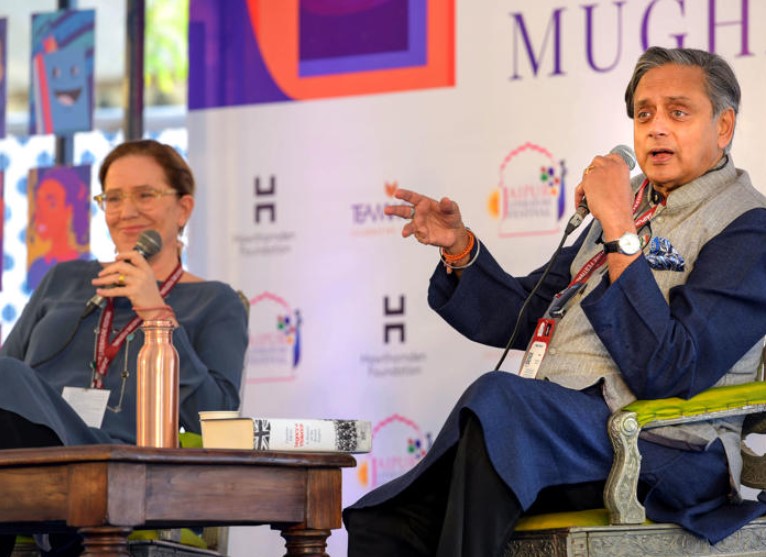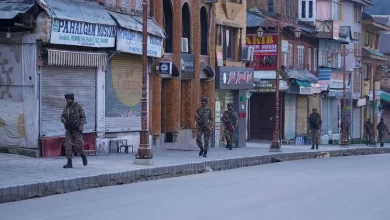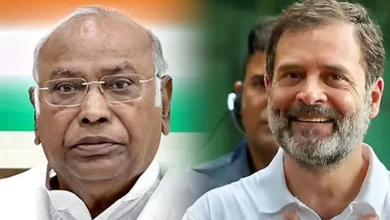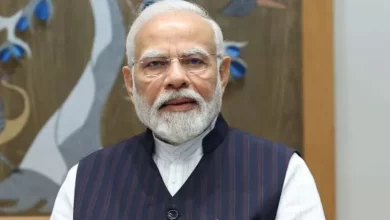Britain has changed domestically: Tharoor on Rishi Sunak becoming UK PM

Rishi Sunak being elected Britain’s first Indian-origin prime minister signals a wind of change in the UK, senior Congress leader Shashi Tharoor said on the inaugural day of the 16th Jaipur Literature Festival (JLF) on Thursday.
The Thiruvananthapuram MP was moderating an interaction session with Pulitzer winner Caroline Elkins about her recent book “Legacy of Violence: A History of the British Empire”.
When Elkins asked him to weigh in on Sunak’s appointment as the British prime minister, Tharoor said, “I think it does suggest that Britain has changed domestically. It has changed also because of the empire. With all those centuries of empire, they ended up creating a situation in which the colonised had pretty much no other aspiration to aim for than to make it to the metropolitan country.”
“And so you did see a lot of people moving there because the British had indoctrinated them into believing that that was the acme of all that was splendid and wonderful in life that was worth aspiring for. So what you saw these folks doing then was heading there and that was also before Independence and much smaller numbers. And after Independence, many people headed that way,” he added.
Last October, the 42-year-old Sunak scripted history when he was appointed by King Charles III as Britain’s first Indian-origin prime minister, after being elected unopposed as the new leader of the governing Conservative Party.
Calling Sunak “an interesting man” who he knew personally, Tharoor said one of the striking aspects about the current UK PM was that the world witnessed a brown person, born to East African Indians, getting a ticket from the Conservative Party.
“If you look at the first five MPs of Indian descent in Britain, starting with 1892, Dadabhoi Naoroji was a liberal. A couple of the MPs who came right after the 1920s were even Communists, Shapurji Saklatvala for example. You actually had people who represented a sort of strain of thinking that would be deemed left of centre during the Empire.
“Today, you’re seeing a brown person getting a ticket from the Conservative, he’s not the only one, there are Blacks… So, all of this suggests that Britain has changed internally,” the Congress MP, who is also the author of “An Era of Darkness: The British Empire in India”, added.
According to Tharoor, Sunak’s appointment is also a tribute to his competence.
“Britain’s in the economic doldrums. You have a prime minister who’s basically messed up — Liz Truss — and the British MPs realise that the only person who can salvage them through sound competent economic management happens to be a brown man. He demonstrated his competence as chancellor of the exchequer of the UK,” he said.
But Brexit shows there is still a lot of prejudice in Britain, added Tharoor, who said he personally experienced racism in the UK in the 1970s.
Terming Sunak’s prime ministership “one of the most delicious footnotes” in UK history, the political leader said, “Guess who nominates the next Archbishop of Canterbury? The prime minister and he’s a Hindu.”
Elkins, who won the 2006 Pulitzer Prize for General Non-Fiction for her book “Imperial Reckoning: The Untold Story of Britain’s Gulag in Kenya”, commented on the push back by Meghan Markle, who also happens to be a person of colour.
Former American actor Markle tied the knot with Prince Harry in 2018. The couple alleged racism from within the family and went to do a tell-all interview with Oprah Winfrey on the same and stepping back as “senior” royals in 2020, among other claims.
Prince Harry and Meghan Markle also signed a deal with Netflix to produce films, documentaries and children’s shows, the first of which, the bombshell docu-series “Harry and Meghan”, arrived late last year. Harry’s recently released memoir “Spare” is the latest in a string of public announcements by the couple since they moved to California in 2020 two years ago.
One of the things that struck her, Elkins claimed, was when Meghan Markle entered into St George Chapel in Windsor, UK, to get married to Prince Harry, she wore a veil that had “all of the flowers of the Commonwealth delicately embroidered” onto the garment.
“She’s literally carrying the weight of the empire on her back, and seems to be at least publicly oblivious to this… And it’s not surprising in many ways.
“We’re not predictive as historians, but it’s not surprising the story has ended, as it has with the decamping and the rest and the jury’s out,” the Harvard professor added.
She further said there was “evidence” that the British Empire used violence as an instrument of administration across its colonies including India, Palestine, Kenya, and Cyprus to name a few.
Citing the examples of the revolt of 1857 in India or the Mau Mau rebellion in the heart of Kenya in 1934, the author said the relationship between “violence, liberalism and law” has evolved over centuries.
JLF will come to a close on January 23.







